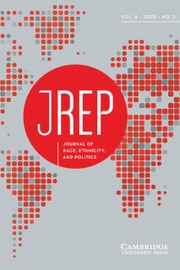Article contents
Racialized Preferences in Context: The Geography of White Opposition to Welfare
Published online by Cambridge University Press: 17 September 2018
Abstract
Research has shown that white Americans oppose welfare spending in part due to their racial prejudices. Yet, this conventional wisdom ignores the importance of local geography in determining whether whites are likely to view welfare in racialized terms. This article demonstrates that the effect of prejudice on whites’ welfare preferences depends on the salience of welfare's racialized image in a given geographic context. I present a novel application of the racial threat hypothesis—conceptualizing both prejudice and place as multidimensional—to argue that the racial geography of an area amplifies the effect of traditional racial stereotypes on welfare preferences, whereas economic geography amplifies the effect of symbolically racist attitudes. I test these propositions using geocoded data from the years following the 1996 U.S. welfare policy reforms. My analysis reveals that racial attitudes are more predictive of welfare preferences not simply where the stigmas of welfare are salient due to a large black population or high poverty rate, but more specifically where residential segregation makes black or poor households more visible from the viewpoint of whites. These findings highlight the subjectivity of the white perspective, and call for more scholarship theorizing whites’ agency in seeing racialized issues as threatening to white interests.
- Type
- Research Article
- Information
- Copyright
- Copyright © The Race, Ethnicity, and Politics Section of the American Political Science Association 2018
References
REFERENCES
- 3
- Cited by


